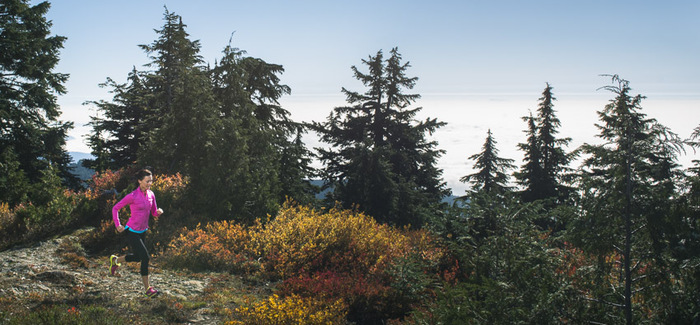
Road to Seek the Peak
Week 6: Marnie Giblin of Pivotal Health
Posted by Julia Grant May 18, 2016
Each week we’ll be featuring posts from special guests designed to help get you ready for the big day. From nutrition info, to training tips, to motivational stories – each post will have valuable info to support your journey, all the way to the Peak!
This week’s post will cover the top 5 tips for pre-race preparation and post-race recovery to help you crush those hills, avoid injury and recover like a champ.
Pre-Race
- It’s North Vancouver – you never know what weather to expect, so train for it all. Trail running and climbing in rainy weather and hot dry conditions will ensure you are adequately trained for slippery terrain or hard packed dust.
- Aim to have an even effort, and an even cadence, regardless of the terrain. To achieve this, shorten your stride on the steeps, lengthen on the flats, and go mid length on moderate terrain. Just like hill climbing on a bike – vary your gears, but keep your effort stable.
- Train yourself to pick up your feet over terrain towards the end of your longer runs. Most falls happen later in the race as you fatigue and don’t get full clearance with you feet.
- Look up, and ahead, even as you tire. This opens your rib cage and shoulders, maximizing oxygen intake and balance, and allows you to see any potential obstacles coming your way.
The day before race day, get out for a short limber up run. Nothing taxing, nothing hilly, as you’re looking for maximum recovery pre race. Stretch your legs for a 20-30 minute run, with 4-6 repeats of 30 second bursts of race pace or equivalent effort.
Post-Race
- Once you’ve crossed that finish, savour the moment! Breathe in the satisfaction that comes from pushing your body physically and mentally.
- Resist the temptation to stop and sit! Walk for 10-15 minutes to allow your body to slowly cool down and minimize the risk of cramping. Follow this with stretching – hit your calves, quads and glutes, along with any personal trouble spots.
- Chow: 16km with massive climbing requires fuel. Get calories in your body within 15 minutes of finishing, even if just juice, as your body gets maximal absorption while it is still storing glycogen in the muscle tissue.
- Chug: start to replenish those fluids as soon as you can tolerate them. Fluid replacement requirements vary by individual and race day conditions, but you are likely to have lost substantial fluid, so get drinking.
- Chill: both in the literal and figurative sense. Within a few hours after racing, cool those legs, especially at any tender points or areas of injury. Resist the craving for a hot bath; although it feels nice in the moment, it draws more blood into the muscle tissue and inhibits recovery.
Marnie Giblin
Physiotherapist
Pivotal Health
